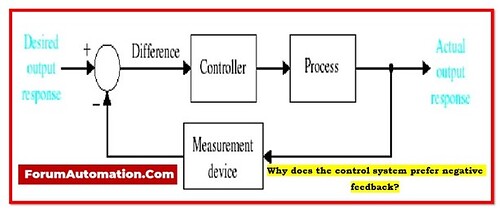In control systems, negative feedback is desired for a number of reasons that are:
- Stability
- Correction of Errors
- Robustness
- Reduces the effects of non-linearity
- Acceptance of Uncertainty
- Reduces Unrestricted Growth
- Controlling System Saturation
- Improvements to Control Performance
Stability
By lessening the effects of disturbances and fluctuations, negative feedback contributes to the stability of the system. The negative feedback control system reacts to counteract output deviations from the desired value, pushing the system back towards the setpoint. The system is kept in a controlled & predictable state thanks to this stability.
Correction of Errors
Negative feedback mechanisms compare the output to the expected setpoint while continuously monitoring the output. The control system performs corrective action in the event of a mistake or deviation in order to reduce the error and return the system to the desired condition. This mechanism for rectifying errors aids in improving control’s accuracy and precision.
Robustness
Negative feedback systems are typically more resistant to external disturbances and changes in the system’s characteristics. The system is able to adapt to changing circumstances and retain the target performance thanks to the corrective measures made by negative feedback.
Reduces the effects of non-linearity
Non-linear behaviour can happen in many systems, particularly complex ones. The effects of non-linearities are often lessened by negative feedback, which facilitates system control and analysis.
Acceptance of Uncertainty
Control systems frequently function in unpredictable real-world settings. The ability of negative feedback to automatically change the control inputs to compensate for these differences makes it useful for dealing with uncertainty.
Reduces Unrestricted Growth
Positive feedback loops in some systems can cause excessive growth or instability in the absence of negative feedback. By offering stabilizing forces and avoiding uncontrolled conditions, negative feedback prevents it.
Controlling System Saturation
The system may not be able to achieve its saturation point or maximum capacity due to negative feedback processes. The negative feedback mechanism minimizes the control effort when the output gets close to a limit, limiting overshoot & potential damage.
Improvements to Control Performance
The ability to tailor the control system for particular performance traits, such as a quicker response time, a shorter settling time, & better disturbance rejection, is made possible through negative feedback.
Even though negative feedback has a number of advantages, it is essential to properly design control systems, taking into consideration the unique requirements and features of the system being regulated. To achieve even greater performance, certain systems may also use a mix of negative & positive feedback, referred to as feedback control with the feedforward control.
